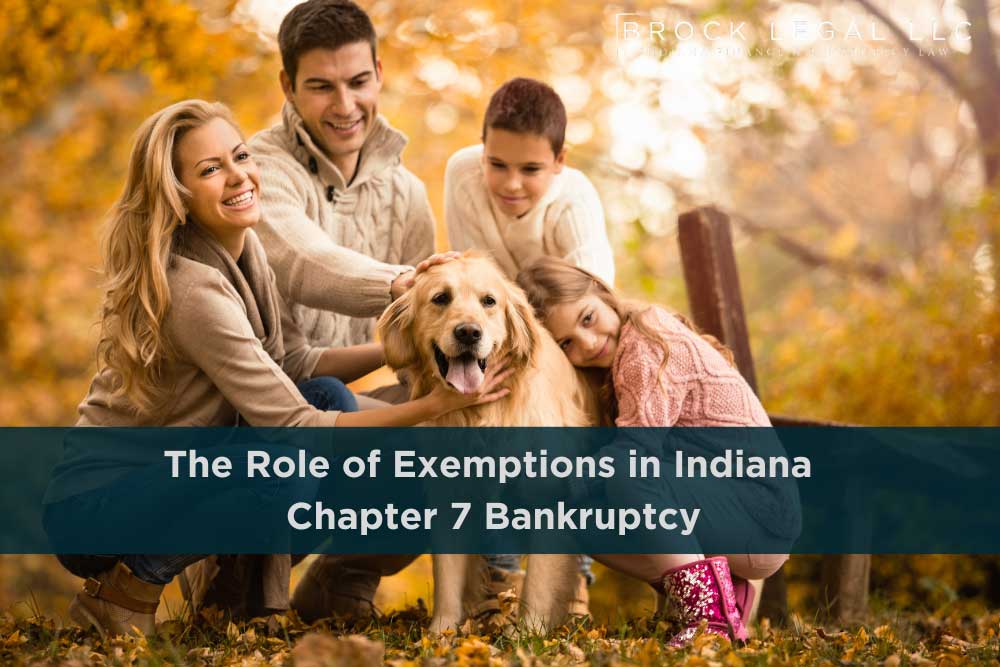The Role of Exemptions in Indiana Chapter 7 Bankruptcy
by Attorney S. Zachary T. Brock

Table of Contents
Indiana Chapter 7 Bankruptcy Exemptions: What Indianapolis Families Need to Know
Exemptions are the rules that let you keep essential property when you file a Chapter 7 case in Indiana. If you live in Indianapolis, Carmel, Fishers, Greenwood, Lawrence, Avon, Plainfield, or a nearby city, the right exemptions can protect your home equity, your car, and the property you use every day. The idea is simple. You list everything you own, apply Indiana’s exemption laws, and whatever is fully exempt stays with you.
Many people worry that filing Chapter 7 means losing everything. That is not how it works for most families. With careful planning, clean paperwork, and honest values, exemptions help you safeguard the assets that keep your life steady while your unsecured debt gets wiped out. This article explains the core exemptions, how they actually work in Chapter 7, and the mistakes to avoid so you can move forward with confidence.
Indiana Bankruptcy Exemptions Overview: How Exemptions Work in Chapter 7
What “exempt” means in an Indiana Chapter 7 case
When something is exempt, the trustee cannot sell it to pay creditors. You still disclose the property, but you also claim the matching exemption on your schedules. If the value fits within the limit, the trustee leaves it alone. If it exceeds the limit, the trustee looks at whether the nonexempt portion would be worth pursuing after sale costs.
How exemptions interact with equity and liens
The trustee cares about your equity, not just the market price. Equity is the value of an item minus valid liens. For a house, that means subtracting mortgage payoffs and judgment liens from fair market value. For a car, subtract the loan payoff. The remaining equity is the amount that must fit within the exemption limit.
Why planning matters in Indianapolis Chapter 7 filings
Exemptions are powerful, but they work best with clean records and numbers you can back up. Before filing, get payoffs in writing, gather recent statements, and think about a realistic sale price for items that may be hard to value. That preparation shortens the trustee’s questions and helps your case run on time.

Key Indiana Bankruptcy Exemptions: What You Can Usually Protect in Chapter 7
Indiana homestead and personal property protections
Indiana provides a group of exemptions that work together to shield what you need day to day. Here are the big ones, plus how we apply them for clients around Indianapolis.
- Homestead exemption for your primary residence. Protects equity in the home where you actually live. We verify occupancy with driver license, utilities, and tax returns. If you and your spouse both have an ownership interest and file together, each spouse may claim an exemption, which can raise the protected amount. We use an appraisal or well supported comps when value is close to the cap so your claim is solid.
- Tangible personal property exemption. Covers household goods, clothing, basic electronics, and similar items up to a total limit. To avoid overvaluing, we use honest thrift values, not replacement costs. Listing items by room keeps the schedules organized and helps the trustee see that your numbers are reasonable.
- Wildcard or catch all tools. Used to protect smaller things that do not fit neatly elsewhere, such as a modest savings balance or a second set of work clothes. Using a small wildcard on the right item can prevent arguments about pennies on the dollar.
- Vehicle and tools of the trade. Indiana allows protection for work tools and, depending on the facts, a portion of vehicle equity. We check payoff letters and Kelley Blue Book or recent local sales to show real world value. If the equity is close, we plan carefully and consider timing.
- Retirement accounts and qualified plans. Most tax qualified retirement accounts are safe in bankruptcy. We collect plan statements to confirm status so there is no confusion with taxable brokerage accounts.
Related reading from the Brock Legal blog
If you want a fast refresher on what stays and why, our post on what assets you can keep in bankruptcy in Indiana is a helpful overview that pairs well with this section.
Applying Exemptions in Indiana Chapter 7 Bankruptcy: Step by Step in Indianapolis
How we calculate equity before filing
Getting the numbers right at the start prevents surprises and keeps your case on track. Here is the process we walk through with Indianapolis clients.
- Pin down value with support. For homes, we start with sales near your block and consider an appraisal if the equity is close to the homestead limit. For vehicles, we look at private party numbers and local listings, then adjust for condition and mileage. For household goods, we use thrift values that reflect actual resale prices.
- List every lien and payoff. We gather first and second mortgages, home equity lines, judgment liens, car loans, and tax liens. Every payoff includes a date and per diem interest. This detail matters because small payoff changes can move equity above or below an exemption limit.
- Apply the right exemption to each item. We match the property to the correct line on the schedules. If spouses file together and both own the home, we stack homestead exemptions when allowed. If you use tools for work, we claim that protection and keep receipts that show purpose and cost.
- Check the trustee’s “net” calculation. In a potential sale, a trustee considers realtor commission, closing costs, and repairs. Those costs reduce the net, which can shrink or eliminate the non-exempt portion. We model both the gross and net outcome so we know where we stand.
- Document your file for smooth review. We keep a clean folder of appraisals, payoffs, statements, and photos of property condition. When a trustee has questions, fast answers reduce risk and stress.
Using exemptions to choose the right path
If your equity is clearly within the exemptions and your income fits the means test, Chapter 7 is usually the simplest route. If equity is tight or you need time to catch up on a mortgage, we also discuss Chapter 13 bankruptcy in Indiana so you can protect the home while you spread payments over time.

Common Indiana Chapter 7 Exemption Mistakes: How to Avoid Costly Errors
Pitfalls we see in central Indiana filings
A handful of avoidable errors cause most problems. Staying clear of these traps can save months of trouble.
- Transferring property to family right before filing. Moving a car or a house share to a relative may trigger look back issues and invites objections. Talk with a lawyer before you transfer anything. Usually we can reach the same goal with safer steps.
- Guessing at market values. Inflated estimates push items over exemption caps; lowball numbers may damage credibility. We use supportable comps, appraisals, and photos of current condition to land on a fair figure.
- Ignoring judgment liens. Old judgments can attach to your home. We run a title check. If a judgment impairs the homestead, we file a lien avoidance motion when the facts allow it.
- Overlooking business or side gig assets. Tools, inventory, and receivables count as property. We list them, apply the correct exemptions, and make a plan for anything that does not fit.
- Misunderstanding retirement protection. Retirement plans are usually protected, but regular investment accounts are not. We separate them early and gather statements to prove status.
Timing choices that matter
Small timing tweaks can change your result. Paying down unsecured debt before filing rarely helps. Fix high priority items like car repairs or insurance so daily life stays stable, then let us time the case when payoffs and values favor your exemptions. If you are being sued or garnished, we also consider the benefit of a fast filing weighed against any equity risk.
Exemptions, Trustees, and Your Meeting of Creditors: What to Expect in Indianapolis
How trustees review exemption claims in Chapter 7
Trustees are trained to verify value and look for non-exempt equity. Expect questions about how you set your home value, where you got the vehicle figure, and whether you own anything not listed. Clear documents and honest answers end most of these questions quickly.
What happens if an item is partly Non-exempt
Sometimes a small slice of equity is over the cap. In those cases we may adjust schedules, consider a negotiated buyback of the non-exempt portion, or review whether costs of sale would leave little for creditors. If productive, we propose a modest payment to the estate that lets you keep the property with minimal disruption.
When Chapter 13 is the better fit
If you are over the cap by more than a sliver, we often compare a Chapter 13 plan that protects the asset while you pay the nonexempt value over time. To understand the differences between the two chapters, you can review Chapter 7 bankruptcy in Indiana as a baseline and then compare it to the Chapter 13 page linked above. For broader context about filing decisions, our long form bankruptcy FAQs for Indiana answers common “what if” questions from first time filers in Indianapolis.
FAQs: Indiana Chapter 7 Bankruptcy Exemptions for Indianapolis and Nearby Cities
We document value carefully with neighborhood sales or an appraisal if needed. We also confirm mortgage and lien payoffs. Because a trustee would subtract sale costs in a real sale, the net figure can create room under the cap. If the cushion is still too thin, we discuss Chapter 13 as a safety net.
Often yes, if the equity fits within available exemptions. We calculate equity using a realistic market price and the loan payoff. If a small amount is nonexempt, we may propose a reasonable settlement to keep the vehicle, or we may consider Chapter 13 if that is a better overall fit.
If both spouses own the home and file together, each may be able to claim the homestead exemption, which can increase the protected total. For other assets, we review who owns what and apply exemptions accordingly. Clear titles and purchase records help us make the strongest claim.
Most tax qualified retirement accounts are protected. We gather plan statements to prove account type and funding. Regular taxable investments do not receive the same treatment, so we plan around those early.
We order a title report to see whether that judgment has been attached to your home. If it impairs your homestead, the bankruptcy code allows lien avoidance in many cases. We file the motion as part of your case so the protection matches the intent of the exemption.

Contact Brock Legal, LLC: Talk With an Indianapolis Bankruptcy Lawyer About Exemptions
You do not have to choose between debt relief and your family’s stability. The right use of exemptions can protect what matters while you reset your finances. At Brock Legal, we explain your options in plain language, build a filing plan around your home and budget, and keep the process calm and predictable. If you want clear next steps from a local team that knows the trustees and the courts, start with a conversation today. Call 317.505.0336 or email zach@indyfinancelaw.com to schedule a free consultation with an Indianapolis bankruptcy lawyer.
Attorney S. Zachary T. Brock

Attorney S. Zachary T. Brock
Zach empowers individuals faced with financial challenges by providing them with effective solutions and unwavering support in the areas of consumer finance and bankruptcy law.
By actively listening and empathizing with each client, Zach works to gain a deep understanding of every individual or family’s unique circumstances. This helps him tailor his legal strategy to best meet the needs of each client.
“No matter what may be weighing you down financially, Brock Legal is here to help. My mission is to help navigate you through whatever stressful circumstance you may be faced with, by offering unparalleled education and service in the areas of consumer finance and bankruptcy law. Let us show you how our firm can help. Contact Brock Legal today!”
-Zach



